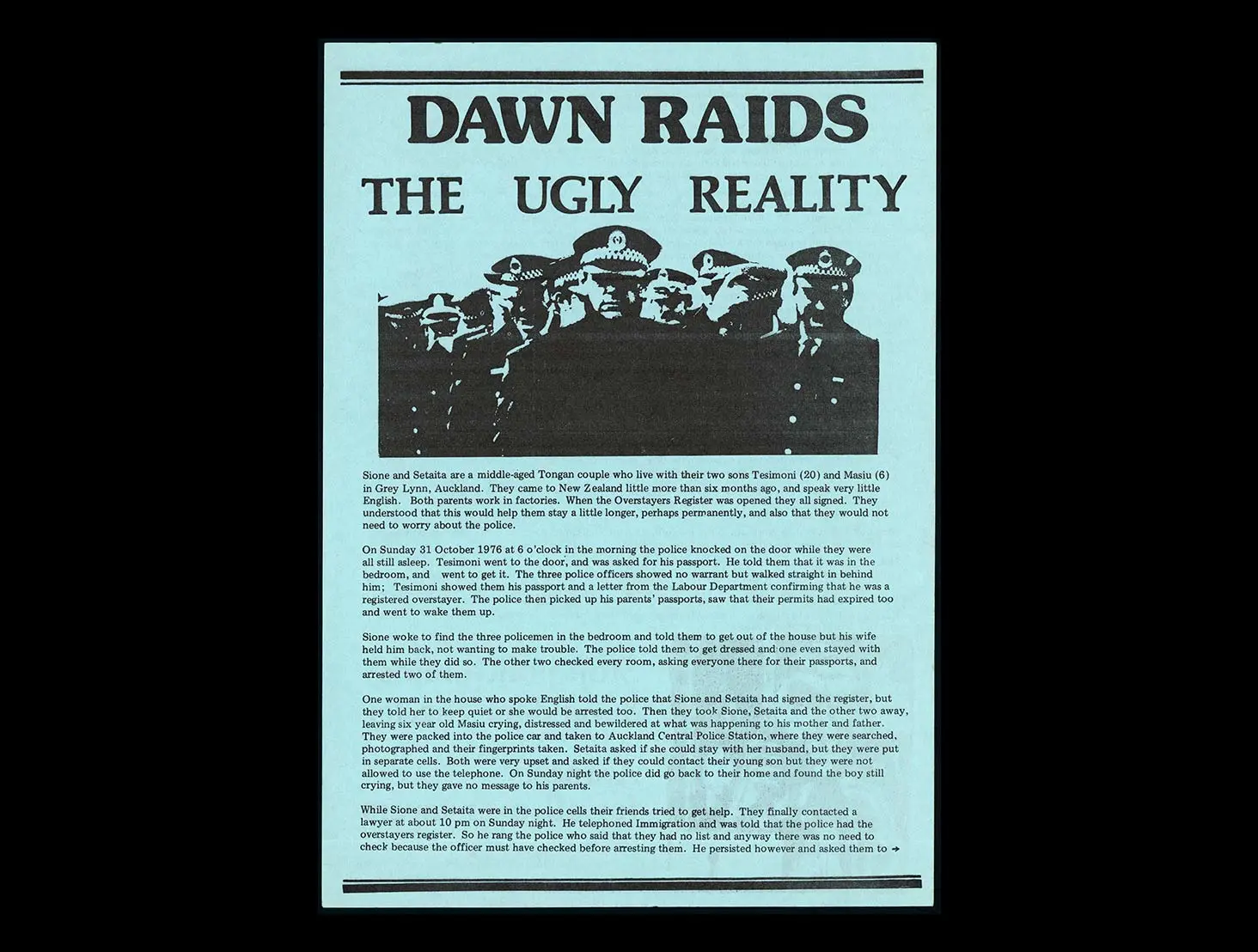Image credit: Front page of ‘Dawn raids: The ugly reality’ information sheet, 1976 prepared by the Auckland Committee on Racial Discrimination, published by Amnesty Aroha. Ref: 94-106-19/07-02 Alexander Turnbull Library.

Image credit: Front page of ‘Dawn raids: The ugly reality’ information sheet, 1976 prepared by the Auckland Committee on Racial Discrimination, published by Amnesty Aroha. Ref: 94-106-19/07-02 Alexander Turnbull Library.

In the 1970s, the dawn raids racially targeted Pacific peoples. If they couldn’t prove they were in Aotearoa New Zealand legally, Pacific peoples were often arrested and deported. Find out more, and explore our collections and curated resources.
This 1976 information sheet spells out why the phrase ‘dawn raid’ has become embedded in the story of Aotearoa New Zealand. It chronicles a police raid on a Tongan couple and their two sons in Grey Lynn, Auckland, at the height of a campaign to catch illegal immigrants, also known as ‘overstayers’. It comes from the collection of labour and trade union historian Bert Roth (1917–1994), donated to the Turnbull Library after his death.
Dawn raids specifically targeted Pacific Islanders and took place during the night or the early hours of the morning. Police would turn up at a home and demand that everyone show them their passports or permits to prove they were in the country legally. If you couldn’t, you would be arrested and held in police cells until you could, or be deported. To have police barge into your bedroom at random times of the night, pull off your bed covers and look through your wardrobe and under your bed was a frightening experience. How did this come about?
In the early 1970s, the New Zealand economy started to falter when the United Kingdom joined the European Community, creating new competition for this major export market, and with the onset of the first oil crisis. Unemployment and the cost of living both rose, and many blamed Pacific Islanders for taking increasingly scarce jobs. In good times, the relaxed application of immigration laws had allowed Pacific people to fill low-paid jobs in factories and service industries. The 1972–75 Labour Government began enforcing the law on overstaying in 1974. Then, having made repatriating overstayers a populist election issue in 1975, the new National government under Prime Minister Rob Muldoon instigated a further wave of policing and prosecutions in 1976.
Pacific Islanders made up only one-third of the overstayers in New Zealand at that time. The rest were from Europe and North America, and yet of those prosecuted around two-thirds were Pacific Islanders.
The dawn raids strained relationships between New Zealand and its Pacific neighbours. They tore families apart, and Pacific homelands struggled with the sudden return of their people to economies where there was already a shortage of jobs. In Aotearoa, the disgraceful treatment of Pacific communities meant they now regarded the police as enemies, leading to a fracture in relations that would take years to mend.
At the same time, these events saw Pacific people mobilising politically to assert their rights, such as the emergence of the Polynesian Panthers, as well as campaigns in solidarity from groups in the wider community, including the Auckland Committee on Racial Discrimination and Amnesty Aroha.
Story written by: Suliana Vea
Copyright: Turnbull Endowment Trust
Read connected stories from Te Kupenga:
Explore the Alexander Turnbull Library collections further: Dawn raids.
Topic Explorer has:
The Pacific: Culture, history and geography — especially the story 'Pacific Island people in Aotearoa New Zealand'
Many Answers has Dawn raids (New Zealand).
Want to share, print or reuse one of our images? Read the guidelines for reusing Alexander Turnbull Library images.
Tikanga ā-iwi:
Te whakaritenga pāpori me te ahurea
Te ao hurihuri
Ngā mahinga ohaoha.
Te Takanga o Te Wā (ngā hītori o Aotearoa):
Whakapapa
Whanaungatanga.
Social sciences concepts:
Identity, culture, and organisation
Place and environment
Continuity and change
The economic world.
Aotearoa New Zealand's histories:
Colonisation and its consequences
The exercise of power
Relationships and connections between people.